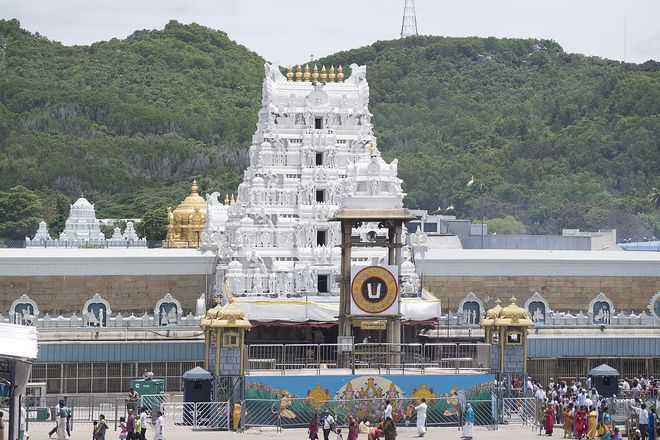
Hundi collections fell to Rs 995.89 crore in 2017 despite a rise in the footfall of pilgrims at Tirumala—the abode of Lord Venkateswara.
Suresh Dharur
Tribune News Service
Hyderabad, January 16
Even the gods were not spared of the effects of demonetisation. Tirumala temple in Andhra Pradesh, the world’s richest Hindu shrine, has recorded a fall in the revenues during 2017 due to the ban on high value currency notes.
The Tirumala Tirupati Devasthanams (TTD), an autonomous body that manages the affairs of the popular hill shrine, attributed the decreased revenues—Rs 50 crore as compared to the previous year—to the central government’s 2016 decision to scrap bank notes of Rs 500 and Rs 1000.
Hundi collections fell to Rs 995.89 crore in 2017 despite a rise in the footfall of pilgrims at Tirumala—the abode of Lord Venkateswara.
In March last year, the Reserve Bank of India had made it clear that it would not accept scrapped notes from the TTD after its deadline for exchanging banknotes. The TTD made a request to the central bank because devotees continued to deposit old banknotes in the Hundis even after they had become invalid.
"Last year Hundi earning was Rs 1,046.28 crore. This time it is Rs 50.39 crore less, due to demonetised notes that were deposited and are of no use. However, earning from 'Online Hundi' was recorded more than last year. This year, the TTD earned Rs 15.36 crore as compared to Rs 10.53 crore last year," the TTD Executive officer Anil Kumar Singhal said. The temple received Rs 26 crore worth banned notes in early part of 2017.
As per TTD records, the number of visitors in 2017 increased by about 7 lakh, from 2.60 crore recorded in 2016. But it did not get reflected in the cash flow.
The central government had given until March 31, 2017, to deposit the scrapped bills in banks. The TTD received most of the banned notes after the deadline.
“For a few months after demonetisation, pilgrims continued to drop the banned currency in the hundi, which later turned out to be useless,” Singhal said.
There was also a huge cash crunch across the country in the first few months of 2017 due to restrictions on cash withdrawals from banks and ATMs and that also contributed to the revenue fall, the temple authorities said.
“The cash crunch might have also resulted in the drop in the hundi collections during the year,” the temple official said.
However, the e-hundi earnings went up from Rs 10.53 crore in 2016 to Rs 15.36 crore in 2017.



























